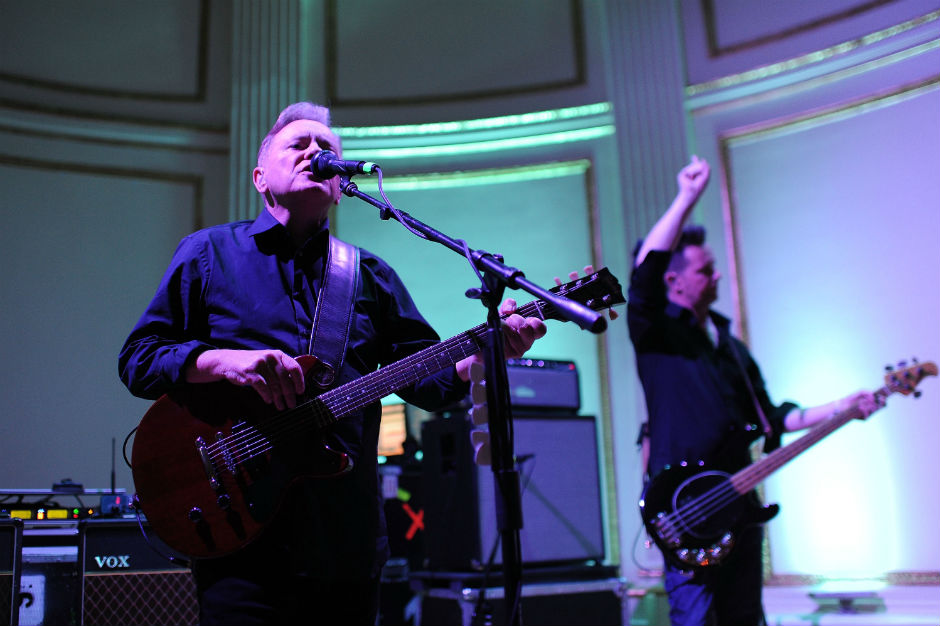For a group whose biggest hits are inseparable from their iconic synth hooks — whether they’re cresting as a tidal wave on top of “Procession,” chirping like ecstatic crickets on “Temptation,” or lighting up the night sky on “Bizarre Love Triangle”— New Order had conspicuously back-seated their signature instrument on their last few LPs. “I felt that by the late ‘90s, I’d gone as far as I could with the keyboard,” frontman Bernard Sumner says of the preference for lead guitars demonstrated on 2001’s Get Ready and 2005’s Waiting for the Sirens’ Call. “I just needed a breather.”
By the second track on the band’s upcoming ninth album Music Complete — that would be the gate-crashing “Singularity” — it’s pretty clear that the break is over. The pulse-racing track is practically coated in synths, simultaneously squelching underneath and zooming in from above, introducing the chorus and dueling throughout the instrumental bridge. Keys are similarly omnipresent throughout the majority of Music Complete — out September 25 on Mute — in a way they haven’t been for New Order since the ’80s. Uncoincidentally, the song is also the most compulsively danceable the band has made in some time; a revisiting of the Balearic euphoria they’d largely eschewed since making one of the decade’s classic alt-dance albums, 1989’s Technique.
The return to form came about largely as a result of the three-and-a-half years New Order spent touring prior to the recording of Music Complete, and the fan response the band noted during various sections of their set. “People in the audience love songs like ‘Ceremony’ and ‘Regret’ and ‘Age of Consent,’ [guitar-based] stuff like that,” Sumner recounts. “But when you hit the section of our set towards the end, where it’s more dance-oriented, that’s the bit where people go apes–t. So it seemed that the time was right to do more of that kind of sound.”
The move was also informed by the comeback of original keyboardist Gillian Gilbert — absent from the group as a full-time member since 1998, when she left in large part to care for the children she’d had with her husband, New Order drummer Stephen Morris. (“The kids are quite older now,” Gilbert explains of her own return to the fold.) “[We had] an idea early on that that was the direction that it was going to go in,” guitarist Phil Cunningham says of the band’s rediscovered synth-poppiness, largely missing since he joined the band in 2001. “And that was the result of the gigs that we’ve doing over the last few years, and having Gillian back in the band.”
However, with the return of one longtime member of New Order comes the departure of another. Music Complete is the first New Order LP not to feature Peter Hook, the group’s co-founding bassist and one of their most identifiable members, who acrimoniously split from the group in 2007 and is currently in the midst of suing the band for continuing to perform and record under the New Order moniker without him. (Hook was replaced by Tom Chapman, a bandmate of Sumner’s during the singer’s time with side project Bad Lieutenant.)
“[It’s] a totally different dynamic, to be honest,” Cunningham says of recording with the new lineup. “The main difference from working with Hooky was, on the Waiting for the Sirens’ Call album, we’d turn up to the studio and there was a blank canvas, and we’d just do hours and hours of endless jamming between me and Steve and Hooky and eventually we’d create something, a song, and an idea would come out of it.”
Rather than jamming out Music Complete, Sumner says the band adapated more of an assembly line mentality, working on the album in discreet groups. “Take a song like ‘Restless,’” the frontman explains of the lead single. “Gillian wrote the intro, and then she did some strings on the middle eight, Phil and Tom wrote the verse, and then I came along and did the strings on the chorus, and additional strings on the middle eight based on what Gillian did.” Cunningham sums up the recording process in an unglamorous way that nonetheless befits a band that’s seen it all over the course of nearly 40 years: “We just treat it like a job, really.”
Despite the workmanlike approach to its conception, the quintet certainly sound like they’re having fun on Music Complete, largely because the album is the most sonically varied, and guest-heavy, that the band has recorded this century. Punk vampire Iggy Pop shows up to read an American Gothic poem over the foreboding Depeche Mode-goes-Miami Vice soundscape of “Stray Dog.” Modern-day acolyte Brandon Flowers (termed the new “hardest working man in show-business” by Sumner) pitches in the chorus to the Pet Shop Boys-like “Superheated.” And the Chemical Brothers — previous collaborators of Sumner on their riotous 1999 single “Out of Control,” which in retrospect feels like a warmup for much of Music Complete — produce a trio of the album’s more explosive cuts.
“I like this album because it’s got a lot of different feels,” Gilbert says of the LP’s expansive palate. “Because New Order used to do that a lot, where we had a lot of [varied-sounding] tracks… we did ‘Elegia’ with no drums and no vocals, and we used to do that because it was exciting to discover doing something different. I think we have a bit more of that on this album.” Cunningham agrees, making explicit the implications of the album title: “I think it is quite diverse, and ‘Music Complete’ really, because it’s got lots of layers in it and it’s really colorful.”
Despite the variety of shades and sounds, the LP’s surfeit of volcanic 4/4 anthems — calling back not only to synth-pop’s heyday, but the pre-New Order days of disco — leave it best-suited for the dancefloor. Don’t expect to find New Order there themselves, though: the band insists their clubbing days are behind them. “I associate going to the club with getting f–ked up. I still like to drink, but I don’t like to get drunk. I think just as you get older… the hangovers get worse. Phil is younger than us, and he had a hangover last three or four days,” Sumner explains. “That part of my life is over.”





